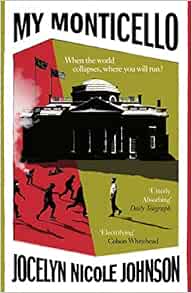My Monticello by Jocelyn Nicole Johnson
Jocelyn Nicole Johnson's My Monticello is set in a near-future world in which the Unite the Right rally was just the beginning and white supremacist groups are rampaging out of control against a background of power shortages and a climate crisis causing devastating floods. Da'Naisha Love, the narrator, is a university student living in one of Charlottesville's mostly Black neighbourhoods when a racist militia descends on the city, setting fire to the homes of Black families. Da'Naisha manages to escape the city in a stolen bus along with her elderly, frail grandmother Ma Violet, her white boyfriend Knox and several of her neighbours, and the group make their way to Monticello, the historic home and estate of former President - and slave owner - Thomas Jefferson.
There is an extra layer of meaning here, because Da'Naisha and Ma Violet are Jefferson's direct descendants via Sally Hemings, a slave who gave birth to several of his children. And Da'Naisha herself is hiding her own pregnancy, unsure whether the father is her white boyfriend Knox or her troubled, Black childhood friend Devin.
My Monticello is a short novel, but its few pages pack a lot of punch. Da'Naisha herself is plagued by conflicting emotions and lingering guilt. Against a background of racial tension, Devin deeply resents Knox, and the only other white members of the Monticello group, a married couple who live across Da'Naisha's street, sometimes feel out of place - and, of course, there's an unspoken awareness that were they and Knox to strike out alone, they would be able to blend in with the very people who threaten the others' lives.
In a book as short as this, there really isn't the space to develop every character fully, but that doesn't matter: this is Da'Naisha's story and Johnson brings her beautifully to life on the page. There are times when her choices are frustrating, and times when Through Da'Naisha's eyes we watch the Monticello refugees form a community and make the grand house of the former President, in which people like them were once enslaved, into a home - one that they are determined to defend against the white supremacist militia if the day should come.
My Monticello is a powerful, nuanced and thought-provoking read that doesn't pretend to give us all the answers to the dilemmas Da'Naisha faces, or to unravel the confusion of her thoughts about history, heritage and race in the United States. Jocelyn Nicole Johnson doesn't spoon-feed her readers, but gives them space to think around the issues raised in the pages of a novel that feels all too frighteningly plausible.

Comments
Post a Comment